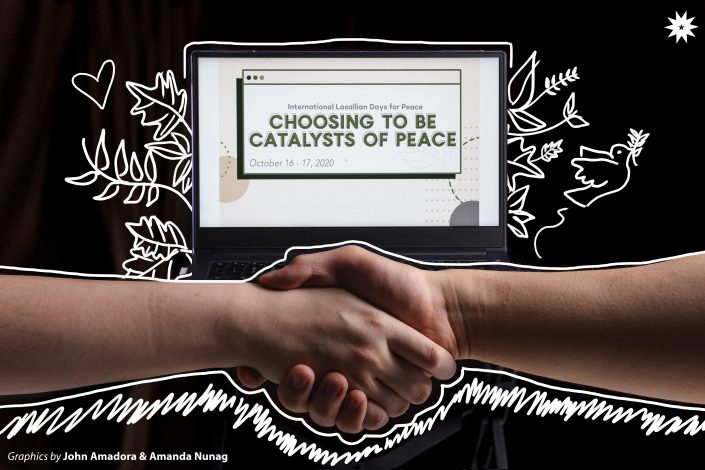Peace, equity, and justice were the points of discussion in International Lasallian Days for Peace (ILDP) 2020: Choosing to be Catalysts of Peace held last October 16 and 17 via Zoom. The event, hosted by the University Student Government’s Office of the Vice President for Internal Affairs, in partnership with De La Salle Philippines and the International Council of Young Lasallians, saw speakers and participants from across different countries raise awareness on their local socioeconomic issues.
Fear of ‘dishonor’
“Seventeen percent of Filipino women will experience physical, sexual, or intimate violence in their lifetime,” pointed out Riza Torrado, National Program Officer of the United Nations (UN) Entity for Gender Equality and the Empowerment of Women, in her opening statement. One of the three main speakers of the conference, she gave the international audience a glimpse of the gender issues plaguing the Philippines.
According to her, poor women are more susceptible to abuse and are often unable to leave toxic relationships because they lack their own sources of income. She lamented, “They fear that if they will separate from [their] husband, they will not have something to fend for themselves and most especially for their children.”
She explained that in some parts of the country, a troubled household is perceived as a “dishonor” to the family, which convinces more than 41 percent of women to remain silent rather than speak out about the abuse they experience.
“It should not be the victim who should feel ashamed [but] the one who perpetrated the crime,” she stressed.
Torrado highlighted how some organizations have drafted policies to address such forms of violence. One of these is the Convention on the Elimination of All Forms of Discrimination Against Women Treaty, an international bill of rights adopted by the UN General Assembly. Meanwhile, she added that the Philippines has the Anti-Violence Against Women and Their Children Act of 2004 and the “Bawal Bastos” law to penalize abusers.
“Speak up—violence against women and gender-based violence is a crime and not a private family matter,” she appealed to the audience. “Maybe in the time of our grandparents, this is the dominant perspective…But no, that perspective has to change.”

Attaining peace
In another session, Maryann Donohue-Lynch, the Associate Executive Director for Mission and Ministry of the Lasallian congregation’s District of Eastern North America, reminded the audience that racial discrimination still exists today.
She pointed to the case of George Floyd, whose brutal arrest and subsequent death at the hands of a police officer sparked widespread uproar that resulted in protests and riots across the United States.
Even in the educational system, there are cases of inequality, Donohue-Lynch said, citing how educational performance is sometimes tied to one’s ethnicity or race. “Many have argued that it should actually be termed the ‘opportunity gap’ because the problem is not in the inability of the students, but in the disparate opportunities that they are afforded,” she explained.
This deprivation of opportunity, which she said is sustained by “systematic racism”, is rooted in “a history of oppression from colonialization, to slavery, to [the] ‘separate but equal’ [doctrine].”
Meanwhile, social justice advocate Fatou Wurie, the third speaker of the session, described what it was like coming from Sierra Leone, a country that was embroiled in an 11-year civil war from the 1990s to the early 2000s. Despite having some semblance of peace and reconciliation in the years that followed, “we emerged fragile—economically, socially, [and] politically,” she said.
Wurie stressed that true peace would require “intentionality” and the “rebuilding of social [constructs] that [have] been degraded by violence”—something that she admitted may take years to accomplish.
Loving one’s neighbor
Familiar with the “complexities” of the world, Wurie stressed the importance of safety, and how having access to education, shelter, and food has become a privilege.
“I understood what safety meant,” she added. “That is a feeling that I want [for] every young girl and boy, especially people from disadvantaged [and] marginalized communities.”
The COVID-19 pandemic has only further widened inequality; marginalized communities not only experience poverty and starvation but also have to contend with the possibility of contracting the disease.
Lasallian East Asia District Visitor Br. Armin Luistro FSC encapsulated this divide by pointing out that although people “may be in the same storm,” they are also “on different boats.”
While he believes that it is justified for people to think about their own safety and forget the rest of the world in times of crises, he nevertheless argued that those who are privileged enough to have proper food and shelter must take the opportunity to help communities in need.
“The challenge of the pandemic today is to recognize that which is essential—which is deepest and to be able to share that with somebody else,” Luistro said, maintaining that the only way to truly attain peace—especially amid the COVID-19 pandemic—is to see and treat one another as a “brother” or “sister” despite differences in language, skin color, and tradition.
